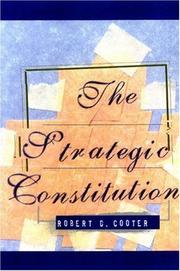| Listing 1 - 2 of 2 |
Sort by
|
Book
Year: 2012 Publisher: Washington, D.C., The World Bank,
Abstract | Keywords | Export | Availability | Bookmark
 Loading...
Loading...Choose an application
- Reference Manager
- EndNote
- RefWorks (Direct export to RefWorks)
Matching grants are one of the most common policy instruments used by developing country governments to try to foster technological upgrading, innovation, exports, use of business development services and other activities leading to firm growth. However, since they involve subsidizing firms, the risk is that they could crowd out private investment, subsidizing activities that firms were planning to undertake anyway, or lead to pure private gains, rather than generating the public gains that justify government intervention. As a result, rigorous evaluation of the effects of such programs is important. The authors attempted to implement randomized experiments to evaluate the impact of seven matching grant programs offered in six African countries, but in each case were unable to complete an experimental evaluation. One critique of randomized experiments is publication bias, whereby only those experiments with "interesting" results get published. The hope is to mitigate this bias by learning from the experiments that never happened. This paper describes the three main proximate reasons for lack of implementation: continued project delays, politicians not willing to allow random assignment, and low program take-up; and then delves into the underlying causes of these occurring. Political economy, overly stringent eligibility criteria that do not take account of where value-added may be highest, a lack of attention to detail in "last mile" issues, incentives facing project implementation staff, and the way impact evaluations are funded, and all help explain the failure of randomization. Lessons are drawn from these experiences for both the implementation and the possible evaluation of future projects.
Access to Finance --- Banks & Banking Reform --- E-Business --- Finance and Financial Sector Development --- ICT Policy and Strategies --- Impact Evaluation --- Learning from failure --- Matching grants --- Microfinance --- Private Sector Development --- Randomization bias

ISBN: 0691096201 0691058644 0691214506 Year: 2002 Publisher: Pirncenton (NJ) : Baltimore, Md. : Princeton University Press, Project MUSE,
Abstract | Keywords | Export | Availability | Bookmark
 Loading...
Loading...Choose an application
- Reference Manager
- EndNote
- RefWorks (Direct export to RefWorks)
Making, amending, and interpreting constitutions is a political game that can yield widespread suffering or secure a nation's liberty and prosperity. Given these high stakes, Robert Cooter argues that constitutional theory should trouble itself less with literary analysis and arguments over founders' intentions and focus much more on the real-world consequences of various constitutional provisions and choices. Pooling the best available theories from economics and political science, particularly those developed from game theory, Cooter's economic analysis of constitutions fundamentally recasts a field of growing interest and dramatic international importance. By uncovering the constitutional incentives that influence citizens, politicians, administrators, and judges, Cooter exposes fault lines in alternative forms of democracy: unitary versus federal states, deep administration versus many elections, parliamentary versus presidential systems, unicameral versus bicameral legislatures, common versus civil law, and liberty versus equality rights. Cooter applies an efficiency test to these alternatives, asking how far they satisfy the preferences of citizens for laws and public goods. To answer Cooter contrasts two types of democracy, which he defines as competitive government. The center of the political spectrum defeats the extremes in "median democracy," whereas representatives of all the citizens bargain over laws and public goods in "bargain democracy." Bargaining can realize all the gains from political trades, or bargaining can collapse into an unstable contest of redistribution. States plagued by instability and contests over redistribution should move towards median democracy by increasing transaction costs and reducing the power of the extremes. Specifically, promoting median versus bargain democracy involves promoting winner-take-all elections versus proportional representation, two parties versus multiple parties, referenda versus representative democracy, and special governments versus comprehensive governments. This innovative theory will have ramifications felt across national and disciplinary borders, and will be debated by a large audience, including the growing pool of economists interested in how law and politics shape economic policy, political scientists using game theory or specializing in constitutional law, and academic lawyers. The approach will also garner attention from students of political science, law, and economics, as well as policy makers working in and with new democracies where constitutions are being written and refined.
Public law. Constitutional law --- Political philosophy. Social philosophy --- Constitutional law --- Game theory. --- Law and economics. --- Philosophy. --- Dret constitucional --- Filosofia. --- Jim Crow laws. --- Pareto frontier. --- accountability: of legislators. --- agenda setting rules. --- bargaining, legislative. --- chaos theorem. --- commodity, contingent. --- condemnation doctrine. --- consequentialism. --- delegation game. --- discussion set. --- emergency doctrine. --- engorgement principle. --- hate speech. --- intransivity. --- judicial review. --- law merchant. --- matching grants. --- maximin. --- natural monopoly. --- patronage system. --- political speech. --- private bads. --- slavery. --- sub-majority rule. --- term limits. --- unicameralism. --- white flight. --- zero-sum game.
| Listing 1 - 2 of 2 |
Sort by
|

 Search
Search Feedback
Feedback About
About Help
Help News
News